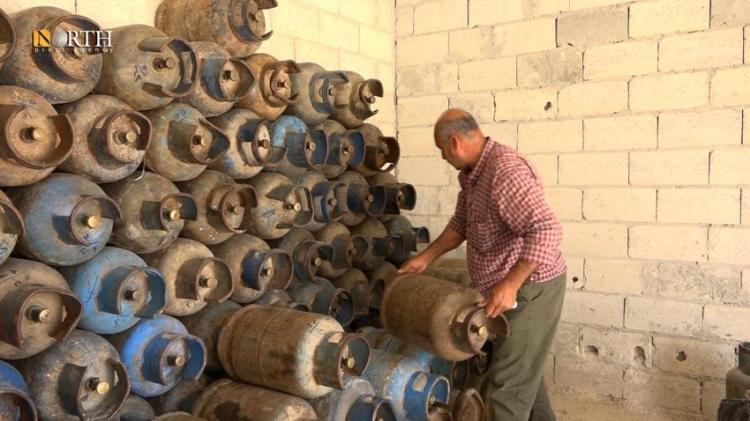Kobani – North-Press Agency
Fattah Issa
Residents in the Kobani region in northern Syria suffer from the problem of damaged safety valves in household gas canisters that are difficult to close tightly, which poses a threat to the lives of their owners. Some describe them as "time bombs" inside houses.
The locals demand that concerned authorities to find a solution, such as changing these bad valves, because they are considered a product with an expiry date like other consumables. Their use leads to gas leakage and fire inside houses, which constitutes an imminent threat to the lives of civilians, especially children.
"Time bombs"
Abdo Khalil Najjar, from the Martyr Khabat neighborhood in the city of Kobani, said that he recently used a canister with a damaged valve in his house, which led to the start of a fire under the valve. However, he addressed the situation and emptied the canister after he had put out the fire "to avoid the danger that may accompany it."
Najjar described the damaged gas canisters as "time bombs" inside the houses, noting that "they must be changed, because these canisters are very old and their valves have not been changed for more than ten years."
Leaking gas
Fidan Saleh said: "Damaged canisters cause gas to leak, so people lose their money without benefiting from it, in addition to that they pose a threat to the families,” demanding gas filling companies change old valves.
The Kobani region contains about 23 centers for gas canister distribution and exchange, 12 of which are within the city's neighborhoods and nine of which are in its countryside, in addition to a special center for the Unions and a special center for Autonomous Administration institutions.
Bozan Khalil Muhammad, head of a gas distribution center in Martyr Khabat neighborhood, pointed out that the center distributes about 1,200 gas canisters to the residents of the neighborhood monthly, noting the existence of about 40 canisters with damaged valves among the quantities they distribute, claiming that "canisters reach us from the factory like that.”
Gas distribution centers periodically witness remarkable crowding by people who are eager to obtain cylinders with good valves, while those with damaged valves remain in the warehouses of the distribution and exchange centers to be returned to the main warehouse of the Directorate of Petroleum to replace them.
Abdullah Haj Hussein, head of the Gas Office at the Petroleum Directorate in Kobani, said: "This problem has been around for ten years because of the lack of the gas filling company in the Remailan region’s ability to replace all the valves.”
Temporary solutions
"We are finding temporary solutions through contracting with a civilian to fill small gas canisters by emptying the gas in the large damaged canisters. In this way, the Directorate gets rid of the problem of the damaged valves and the contracted person benefits," Hussein added.
The Directorate distributes and replaces between 16,000 to 22,000 gas canisters per month for residents of the Kobani region, at SYP 2,400 per canister; these prices differ relatively in the rural area due to the cost of transportation and freight.
Abdullah Haj Hussein points out that the problem of the damaged valves is present in all cities and regions of northeastern Syria, which leads some to use a shunt as a temporary measure, which is placed between the damaged valve and the gas clock. This is an iron piece available for about SYP 1,000.
Maintenance under study
The SADCOP Petroleum Company produces approximately 14,000 gas canisters a day in the town of Remailan, east of Qamishli, and distributes them through an accredited network to meet the population’s needs, according to the data of the Petroleum Office that manages the filling and distribution process.
In a phone call with North-Press, Sadiq Amin Muhammad Khalaf, co-chair of the Petroleum Office in northeastern Syria, said that they are studying the creation of a maintenance workshop for canisters in Remailan’s gas factory in the coming period, which will help to solve the problem in a large scale.
15% of the canisters are damaged
He noted that more than 15% of the canisters available in the region are damaged, as they are old and have not been subject to maintenance for a long time, noting: "the problem is not only with the valves, but there are many canisters whose covers or bodies have been subjected to great damage. We often ask for new valves from the Kurdistan Region in Iraq, but only a few reach us because they are not available in the required form and quantity."
During the past year, Qamishli, Hasakah, and their countrysides witnessed a number of gas explosions and resulting casualties, according to local media reports.

